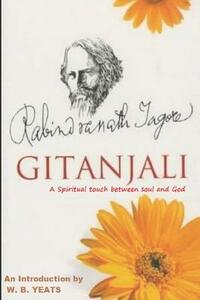Take a photo of a barcode or cover
138 reviews for:
The Gitanjali (English): The Nobel prize Winner Book for Literature
Rabindranath Tagore
138 reviews for:
The Gitanjali (English): The Nobel prize Winner Book for Literature
Rabindranath Tagore
emotional
funny
informative
medium-paced
reflective
medium-paced
Plot or Character Driven:
N/A
Strong character development:
N/A
Loveable characters:
N/A
Diverse cast of characters:
N/A
Flaws of characters a main focus:
N/A
Such magnificent prose I'm gonna cry. It feels like the whispers of your lover pouring into your ears and lulling you to sleep, where beautiful dreams await you. These are the lyrics that touched the very core of my soul, and I want to immerse myself in the world of Tagore so badly, I want to scream each lines of this book out loud so badly that my heart throbbed and shivered at every word.
This is pathetic but this book has really changed me.
6/5☆
This is pathetic but this book has really changed me.
6/5☆
fast-paced
challenging
emotional
hopeful
mysterious
reflective
slow-paced
Plot or Character Driven:
N/A
Strong character development:
N/A
Loveable characters:
Yes
Diverse cast of characters:
N/A
Flaws of characters a main focus:
N/A
"And again when it shall be thy wish to end this play at night, I
shall melt and vanish away in the dark, or it may be in a smile of the
white morning, in a coolness of purity transparent"
i wish i can say the above lines amazed me, but i cant, the truth is every word was soothing to my soul and made feel connected with my inner self.
shall melt and vanish away in the dark, or it may be in a smile of the
white morning, in a coolness of purity transparent"
i wish i can say the above lines amazed me, but i cant, the truth is every word was soothing to my soul and made feel connected with my inner self.
reflective
Though I read parts of Gitanjali in school, I never ventured near poetry after that. Then while randomly looking for some other book, Amazon suggested this and I picked it up. Each of the 103 poems in the slim volumes speaks to you in different ways. A magnitude of emotions are examined and each poem satiates you, yet leaves you gasping for more.
Now, I really wish my Bengali were better so I could read them in the original!
Now, I really wish my Bengali were better so I could read them in the original!
emotional
hopeful
reflective
slow-paced
Before reading Gitanjali I firmly believed that translations don't have the same tone and depth of the original text, but that changed after I read this. Gitanjali is a small but sprawling book about devotion, love, despair, and about Life of the ordinary. These things are so well thought of and written that one would forgive the fact that there is no rhythm or rhyme in Tagore's Poetry. (Of course, that's an another class of poetry onto itself, but I always enjoyed the rhythmic superiority traditional poetry more.)
In Gitanjali, Tagore implores for the arrival, presence, and acceptance of his Lord. He needs these things for all of his time, in life, in death, and also whatever comes after that. He craves the love of his Lord, but he does in vain; He loves none but his Lord; He sings and writes for his Lord. What one might find astonishing his utter and uninterrupted devotion to his Lord. Tagore devotion seems s powerful that the reader is easily convinced that his devotion extends beyond his writings, well into and, as he believed, past his Life.
There are also Poems that reflect on provincial, Royal, and criminal life. Even through these poems, Tagore searches for the only thing he desires, the king of kings, his Lord. One might think that this recurring theme might get monotonous, but Tagore impeccable mastery of writing leaves this volume in the company of the immaculate works of poetry.
One of the other merits of Gitanjali is how easily it can be interpreted and understood. Unlike traditional Poetry, Gitanjali takes most its material from nature and Life and conveys it in the most explicit way. Tagore writes about the skies and seas, all the while providing the reader with a moral one finds in a simple fable. Like I wrote, this is small but sprawling volume about pure art.
In Gitanjali, Tagore implores for the arrival, presence, and acceptance of his Lord. He needs these things for all of his time, in life, in death, and also whatever comes after that. He craves the love of his Lord, but he does in vain; He loves none but his Lord; He sings and writes for his Lord. What one might find astonishing his utter and uninterrupted devotion to his Lord. Tagore devotion seems s powerful that the reader is easily convinced that his devotion extends beyond his writings, well into and, as he believed, past his Life.
There are also Poems that reflect on provincial, Royal, and criminal life. Even through these poems, Tagore searches for the only thing he desires, the king of kings, his Lord. One might think that this recurring theme might get monotonous, but Tagore impeccable mastery of writing leaves this volume in the company of the immaculate works of poetry.
One of the other merits of Gitanjali is how easily it can be interpreted and understood. Unlike traditional Poetry, Gitanjali takes most its material from nature and Life and conveys it in the most explicit way. Tagore writes about the skies and seas, all the while providing the reader with a moral one finds in a simple fable. Like I wrote, this is small but sprawling volume about pure art.




